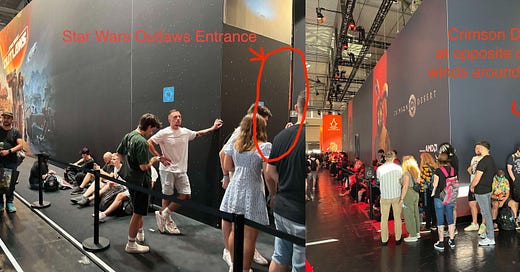Gamescom and the efficiency of gaming's public markets
This year’s Gamescom had me thinking about the efficiency of public markets when it comes to gaming equities (or the lack thereof…)
One of the core requirements for an efficient market is that all sources of valuable public material information are hunted down - an infamous example being the commodity traders that purchased satellite data to see how the overfilling of oil tankers would dictate oil futures trading at negative prices🛢
Is that same degree of rigour applied to an increasingly public gaming industry with its spate of IPOs since COVID?
To be frank, sell-side coverage is subpar vs other tech verticals. We get why - there just aren’t the incentives to cover this industry in public markets yet. Long-only funds typically avoid gaming given the unpredictability of its future cash flows.
📈 But given the spate of long-short activity in highly volatile names like Unity and Team17, you’d think there would be more emphasis on systematically collecting the kind of consumer information presented at events like Gamescom.
🗒 Why is there no common practice of counting the total numbers of queuers for titles to be released? Or better yet, exit polling that asks everyone who emerges from AC Shadows or Splitgate 2 to rank it 1-10?
A cursory attempt at such surveying would tell you that Star Wars Outlaws is likely to be dead-on-arrival whilst Crimson Desert is more likely to surprise to the upside, given their respective queues (see images taken 1-2 minutes apart):
We know there is usually a close relationship between the wishlist to purchase conversion ratio and a new game’s recommendation score. Why not try to curate an exit poll review score *weeks/months ahead* based on alpha versions demo'd (especially given how curated “influencer reviews” are of those same titles)?
💵 If you have (1) the number of wishlists, (2) a forecasted beta of wishlist to sales conversion ratio (above 1 if well-reviewed, i.e, achieves virality) given (3) an exit poll review score, then you could back out (4) an estimate of initial sale revenue of the new IPs and contrast it to (5) xyz market expectations for the new game's revenue.
Sure there’s a great deal of noise here. The above might not yield any material results for forecasting new game revenue... but how would we know until it’s even tried?




